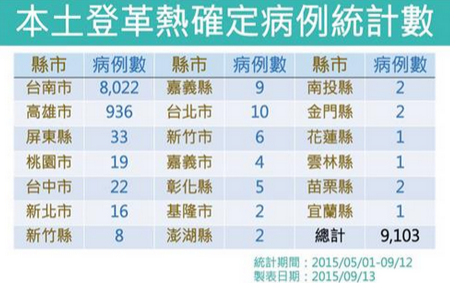The dengue fever surge in southern Taiwan has been enormous for the island country, both on a health basis and an economic basis, and the outbreak continues to spiral topping 9,000 cases, according to the latest data from the Taiwan CDC today.
 The total tally through Saturday stands at 9,103. Last Monday, this website reported the country going over the 6,000 case mark, an increase in 3,000 cases in less than a week.
The total tally through Saturday stands at 9,103. Last Monday, this website reported the country going over the 6,000 case mark, an increase in 3,000 cases in less than a week.
The bulk of the cases are reported from Tainan (8,022) and Kaohsiung (936).
In fact, the dengue epidemic in the south is affecting the wallets of the tourism industry. A Xinhua report yesterday says more than 80 percent of tourists planning to travel to south Taiwan’s Tainan have canceled their trips over fears of a dengue fever in the city.
Dengue fever is an infectious disease carried by mosquitoes and caused by any of four related dengue viruses. This disease used to be called “break-bone fever” because it sometimes causes severe joint and muscle painthat feels like bones are breaking.
People get the dengue virus from the bite of an infected Aedes mosquito. It is not contagious from person to person.
There are three types of dengue fever in order of less severe to most: the typical uncomplicated dengue fever, dengue hemorrhagic fever (DHS) and dengue shock syndrome (DSS).
Robert Herriman is a microbiologist and the Editor-in-Chief ofOutbreak News Today and the Executive Editor of The Global Dispatch
Follow @bactiman63


One thought on “Taiwan records 3,000 dengue cases in less than a week”